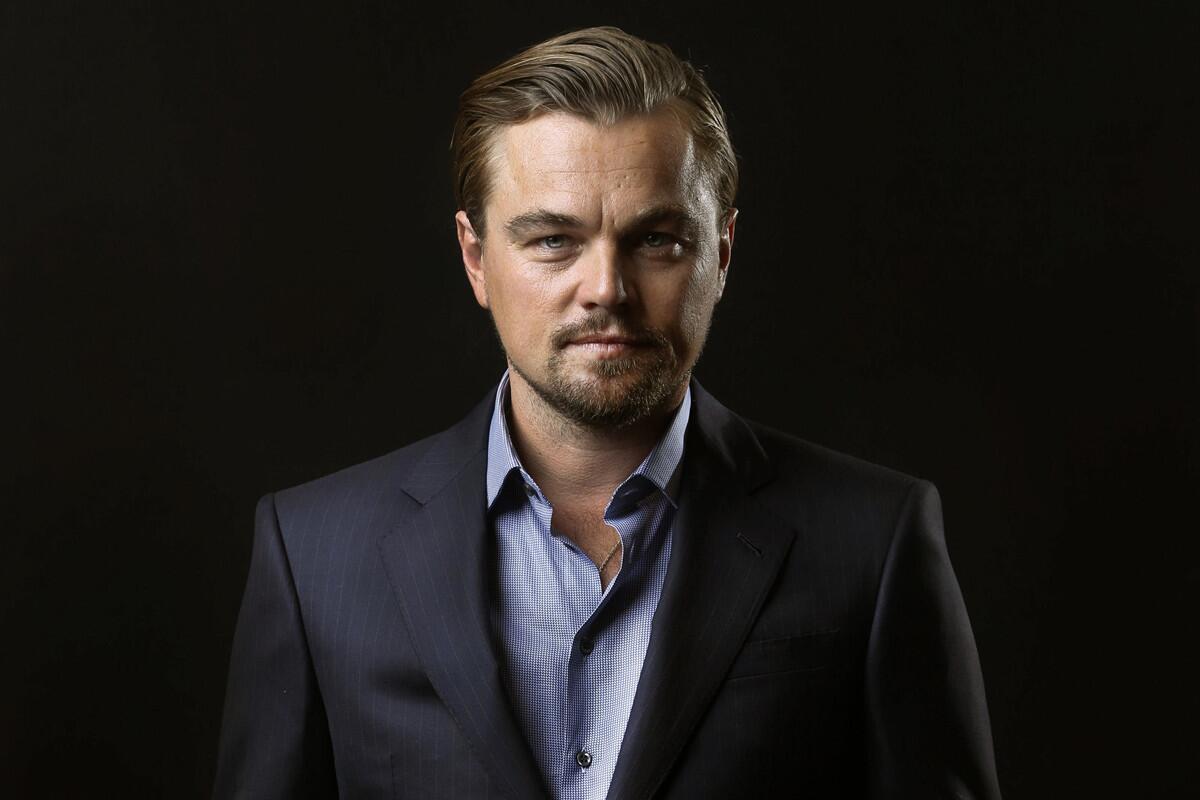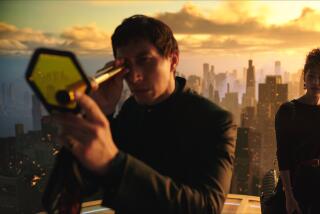Oscars 2014: Leonardo DiCaprio deserves, but doesn’t need, a win

“Will you still love me, when I’m no longer young and beautiful?”
So asks the musical question in a Lana Del Rey song used as a refrain throughout the recent adaptation of “The Great Gatsby.” In some sense it is a question that Leonardo DiCaprio, who plays the title role, has seemed to be asking audiences ever since the explosive fame of “Titanic” made him an international superstar.
DiCaprio is a double Oscar nominee for “The Wolf of Wall Street,” as both actor and producer, and along with “Gatsby,” the roles showcase him as an artist at a new peak of his powers. Taken together, they demonstrate his remarkable range, capable of an achingly internalized turn in “Gatsby” and a grotesquely externalized one in “Wolf.”
FULL COVERAGE: Oscars 2014 | Red carpet
These recent performances raise a fascinating question: Is Leonardo DiCaprio the last real movie star? Or, more specifically, is he the last of a certain breed of American movie actor, a deeply serious, immersive performer who represents the final stop in the lineage of wounded, soulful masculinity that threads along from Marlon Brando through James Dean, Robert De Niro, Al Pacino, Sean Penn, Benicio Del Toro and on forward to him?
With its bold combinaiton of physical comedy, outrage-inducing obliviousness and unapologetic brashness, DiCaprio’s turn in “Wolf” stands apart from his fellow lead actor Oscar nominees, with little in common with Christian Bale’s chameleon versatility, Chiwetel Ejiofor’s theater-trained gravitas, Matthew McConaughey’s unexpected reemergence and Bruce Dern’s valedictory lap.
DiCaprio retains a mystique about him that is rare for a movie star these days. He is right there, right in front of us, and yet he remains unknowable even as his personal life makes for tabloid fodder. What’s more, for someone so famous he manages to slip away inside his roles as if dancing with his own movie star self as partner.
PHOTOS: Movie mainstays who have never won an Oscar
In a recent radio interview with Elvis Mitchell, DiCaprio recalled the acting that really first spoke to him as a teenager, performances like De Niro’s in “Taxi Driver” or Dean’s in “East of Eden.” And that is the lineage in which DiCaprio clearly falls, one of an expressive naturalism that now seems outsized and even a bit outdated. Even De Niro doesn’t act in that particular De Niro-esque style anymore.
The seriousness with which DiCaprio approaches each role, with the earnestness of really meaning it, itself sets him apart from many other actors of today. Where DiCaprio tends to go big, a rumbling explosiveness propelling his performances, someone like Joaquin Phoenix presents something quite different, a more subtly microscopic approach that represents a more contemporary style of acting. Or look at the way Ryan Gosling always seems to be both inside and outside his roles at the same time, laughing at himself even as he is in the middle of a performance.
DiCaprio also acknowledged in that interview that it was when he was cast opposite De Niro in 1993’s “This Boy’s Life” that he feels his career really began in earnest. In turn, Martin Scorsese has frequently said it was De Niro who first pointed him in the direction of DiCaprio.
OSCARS 2014: Full list of winners | Quotes from the stars
The ongoing DiCaprio-Scorsese collaboration — “Gangs of New York,” “The Aviator,” “The Departed,” “Shutter Island” and now “The Wolf of Wall Street” — has been deeply rewarding for both. Each has been nominated for multiple Academy Awards over the span of their work together, and it seems significant that Scorsese finally won his long overdue director Oscar for one of his films with DiCaprio. The actor has helped the director maintain a vitality and box office oomph, while DiCaprio has clearly matured as a performer under the tutelage of Scorsese.
Watching “Gangs” now, DiCaprio does look a bit lost, uncertain of himself, while in “The Aviator” he seems to really find himself, or rather slip away inside the role. From there, with the underworld operatics of “The Departed” and the psychodrama puzzlebox of “Shutter Island,” he has only risen and grown with each new role.
DiCaprio obviously wants to be seen as more than just a pretty face, leading some to utter that classic line of him being a character actor trapped in a leading man’s body. But that in some ways misunderstands him, for he is every ounce the leading man, both in his marquee good looks but also in the way he commands the screen. You want to look at him even as he explores characters whose raw emotions and bad life choices beg you to look away.
FULL COVERAGE: ‘The Wolf of Wall Street’
In both “The Great Gatsby” and “The Wolf of Wall Street,” he plays young men who make a lot of money through illicit means in an attempt to buy their way into a life of class and privilege. Both roles also play into the anxiety about rampant greed and selfishness as corrupting agents in contemporary society, which perhaps signals that DiCaprio isn’t as cut off from the rest of us as one might presume of a movie star.
“Gatsby” director Baz Luhrmann has referred to the title role as “the American Hamlet” for the way in which the character remains aloof and unknowable while also speaking to some essential part of the national identity. If the movie is undermined by Luhrmann’s dervish stylistic flourishes, there are few recent moments as perfectly thrilling as when DiCaprio is first seen onscreen in all his handsome beauty, lifting a champagne glass in welcoming toast as fireworks burst behind him.
His performance is marvelously interior, as he turns Gatsby’s class insecurities and romantic yearnings inward upon himself. He seems at moments as if he is a dark star collapsing, overwhelmed by seeing everything he ever wanted slipping away.
PHOTOS: 14 awkward Oscar moments | Timeline
In “Wolf,” DiCaprio’s character of Jordan Belfort, a shady stock hustler taking on the façade of a respectable trader, introduces himself to the audience as he is seen in freeze frame having just tossed a dwarf at a target in a bit of impolite office fun. DiCaprio’s face is contorted into a grotesque grimace, his hands grasping outward — the image every bit as ugly as his “Gatsby” entrance is gorgeous.
The films share one parallel scene, in which DiCaprio’s character attempts to win favor by cutting someone in on a sweetly profitable if dubiously shady stock trade. In “Gatsby” the gesture is because his character wants to give people what he thinks they want from him, while in “Wolf” Belfort knows of no other way to communicate except by transaction. In both, the world is reduced to giving and taking, with DiCaprio acting as middleman.
I have spoken to DiCaprio once, a little more than a month ago on the phone for approximately seven minutes. It was one of those somewhat pro-forma smash-and-grab “reaction calls” on the morning the Oscar nominations are announced. When I asked if he cared one way or the other, there was not the dramatic pause I expected.
PHOTOS: Movie scenes from ‘The Wolf of Wall Street’
“Of course, man!” came his immediate response before he went on to speak about “Wolf” as a years-in-the-making passion project.
The scale of the intense dramas that DiCaprio seems to favor requires Leonardo DiCaprio to get them made, as they aren’t the kind of movies the Hollywood studios are much interested in making anymore.
Part of me wants to see DiCaprio finally win an Oscar as recognition for the deep, serious effort he has put into his own work, but part of me also recognizes the hunger inspired by his complicated relationship with the disapproving parent of the Academy of Motion Picture Arts and Sciences. He deserves one, clearly, but also may be better served by keeping institutional acceptance at arm’s length for at least a little longer.
PHOTOS: Behind the scenes at the Oscars
With the twin pole performances of “The Great Gatsby” and “The Wolf of Wall Street,” tinged with melodrama, excess, self-loathing and regret, in parts ferocious, yearning, sparkling, angry and sad, he has achieved a greatness that will last longer than the momentary glory of any award. Regardless of whether he wins an Oscar this year, or ever, Leonardo DiCaprio has nothing left to prove. He is his own man now.
More to Read
Only good movies
Get the Indie Focus newsletter, Mark Olsen's weekly guide to the world of cinema.
You may occasionally receive promotional content from the Los Angeles Times.











